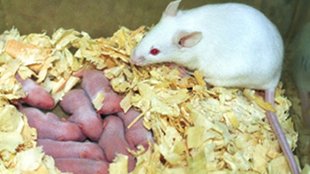 WIKIMEDIA, WHATIGUANAA person’s lifespan may be determined in part before they are even born, if research published today (October 9) in Scientific Reports translates from mice to humans. The new study shows that mitochondrial DNA mutations in the mother’s eggs can shorten her pups’ lives by approximately one third.
WIKIMEDIA, WHATIGUANAA person’s lifespan may be determined in part before they are even born, if research published today (October 9) in Scientific Reports translates from mice to humans. The new study shows that mitochondrial DNA mutations in the mother’s eggs can shorten her pups’ lives by approximately one third.
“The overriding importance of this kind of work is the demonstration that the mitochondrial DNA, which is maternally inherited, carries the genetic information that can be critical for longevity,” said Douglas Wallace, a professor of pathology and laboratory medicine at the Children’s Hospital of Philadelphia. Wallace was not involved in the new study, but has independently shown that maternally inherited mitochondrial mutations can influence aging, longevity, and cancer.
The new paper follows up on a study published last year in Nature, which showed, among other results, that mutated mitochondrial DNA from mom is sufficient to cause premature aging in an otherwise wild-type mouse—a finding that Gerald Shadel, a professor of pathology and genetics at Yale University, described as “a real breakthrough.”
But because of the ...



















